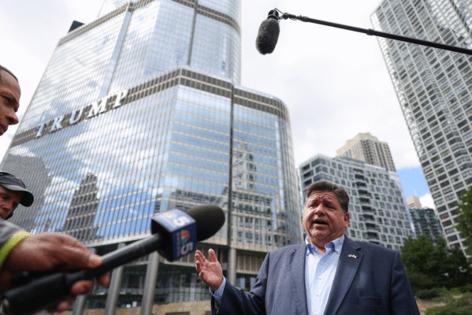Heidi Stevens: Chicago is filled with people whose hearts and lives are devoted to solving its violence. Donald Trump has no such devotion.
Published in Lifestyles
The week began with Illinois Gov. JB Pritzker standing in front of the Chicago River, flanked by Chicago Mayor Brandon Johnson, two U.S. senators and dozens of city and state leaders, urging President Donald Trump not to deploy National Guard troops to Chicago.
“This is not about fighting crime,” Gov. Pritzker told the assembled crowd. “This is about Donald Trump searching for any justification to deploy the military in a blue city in a blue state to try and intimidate his political rivals.
“This is about the president of the United States and his complicit lackey Stephen Miller searching for ways to lay the groundwork to circumvent our democracy, militarize our cities and end elections,” he continued. “There is no emergency in Chicago that calls for armed military intervention. There is no insurrection.”
His words carried far, and his words carried weight.
The next day, another group assembled a news conference a few blocks south, in Chicago's Federal Plaza. Their words didn’t make it to CNN. But they should have.
“To have the military come in and push his agenda,” said Eric Wilkins, “that’s just really being bullied.”
Wilkins, 54, was shot and paralyzed in Chicago’s Roseland neighborhood in 1999. Now he works as an organizer with Communities United. Wilkins was one of several gun violence survivors and gun safety advocates gathered at that second news conference, which was organized by One Aim Illinois, according to the Tribune’s Rebecca Johnson, who reported from the scene.
Johnson also quoted Artinese Myrick, a deputy director with Live Free Illinois.
“Bringing the National Guard to Chicago is not a solution,” Myrick said. “It is an attack. It sends a message that Black communities are problems to be controlled, rather than people who need to be supported.”
Myrick and others called on the president to reinstate the federal funding for gun violence prevention programs that he slashed in July. They called for more investment in job programs and other proven violence disruptors.
“We know what safety looks like,” Myrick continued. “It looks like jobs. It looks like access to healing. We will not be silent while our neighborhoods are treated like war zones.”
What often gets lost in the dialogue about Chicago is the tremendous, tireless work that takes place here day in and day out to prevent violence, to heal trauma, to build and sustain communities that honor people’s dignity and protect their safety and peace.
The work is done against a backdrop of historic redlining, community disinvestment, decades of school closures, cuts to mental health resources, food and health care deserts, vast wealth and life expectancy gaps, and other obstacles that rarely make their way into the discourse of folks who blithely label Chicago a killing field.
The work is also working. In the first six months of 2025, Chicago had a 33% reduction in homicides and a 38% reduction in shootings, according to city data.
The problem with touting crime numbers is that unless the numbers are zero, they’re still too high. One homicide is one too many. One traumatized child is one too many. One brokenhearted mother is one too many.
But the problem with ignoring progress and calling for something as extreme as militarized streets is that it sneers instead of solves. It writes off Chicago’s people as inept and its problems as intractable. Neither could be further from the truth.
Chicago is an endless stream of people — educators, artists, activists, first responders, public servants, students, parents, writers, philanthropists, doctors, nurses, social workers, street vendors, community organizers, entrepreneurs — whose hearts and lives are invested in solving what plagues us. In nudging the city toward a healthier, safer, more equitable version of itself.
We bristle when Chicago is maligned and mischaracterized. That’s not a blind spot. That’s love. That’s loyalty. That’s commitment. And it’s the belief that we’re worthy of those things. Because Chicago, like humanity, is complicated and messy and lovely and flawed and worth the effort.
And it’s hardly an outlier. Everything that plagues Chicago also plagues America. At least two children were just killed and more than a dozen people were injured when a shooter opened fire Wednesday at a Catholic elementary school in Minnesota during mass.
It’s cynical and gruesome to stack death and despair in neat little rows, as if less of it somewhere else, or more of it somewhere else, makes it any less horrific every time and every place it happens. But Chicago, if anything, is a mirror.
And its problems — and solutions — reflect our priorities. Safe and peaceful streets should be top among those priorities. But not through brute force. Not by circumventing the people who live and work and lead here.
Not by trampling all over progress, just to score political points.
©2025 Tribune News Service. Distributed by Tribune Content Agency, LLC.
























Comments